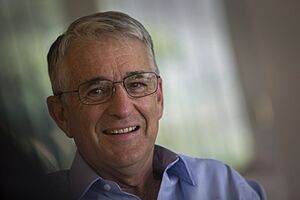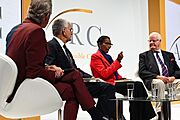John Anderson (Australian politician) facts for kids
Quick facts for kids
John Anderson
AC FTSE
|
|
|---|---|

Anderson in 2017
|
|
| Deputy Prime Minister of Australia | |
| In office 20 July 1999 – 6 July 2005 |
|
| Prime Minister | John Howard |
| Preceded by | Tim Fischer |
| Succeeded by | Mark Vaile |
| Leader of the National Party | |
| In office 20 July 1999 – 23 June 2005 |
|
| Deputy | Mark Vaile |
| Preceded by | Tim Fischer |
| Succeeded by | Mark Vaile |
| Minister for Transport and Regional Development | |
| In office 21 October 1998 – 6 July 2005 |
|
| Prime Minister | John Howard |
| Preceded by | Mark Vaile |
| Succeeded by | Warren Truss |
| Deputy Leader of the National Party | |
| In office 23 March 1993 – 20 July 1999 |
|
| Leader | Tim Fischer |
| Preceded by | Bruce Lloyd |
| Succeeded by | Mark Vaile |
| Minister for Primary Industries and Energy | |
| In office 11 March 1996 – 21 October 1998 |
|
| Prime Minister | John Howard |
| Preceded by | Bob Collins |
| Succeeded by | Mark Vaile |
| Member of Parliament for Gwydir |
|
| In office 15 April 1989 – 17 October 2007 |
|
| Preceded by | Ralph Hunt |
| Succeeded by | Division abolished |
| Personal details | |
| Born | 14 November 1956 Sydney, New South Wales, Australia |
| Political party | National Party of Australia |
| Spouse | Julia Robertson |
| Children | 5 |
| Alma mater | The King's School, Parramatta, University of Sydney |
John Duncan Anderson (born 14 November 1956) is an Australian politician. He was the 11th Deputy Prime Minister of Australia and leader of the National Party. He held these roles from 1999 to 2005.
He also served as a government minister. His jobs included Minister for Primary Industries and Energy and Minister for Transport and Regional Development. These roles were part of the Howard government.
As a minister and later Deputy Prime Minister, John Anderson was in charge of important areas. These included farming policies, transport, and water rights for agriculture. He was also part of Australia's National Security Committee from 1999 to 2005. This was a time when the world faced challenges like the War on terror and the Bali bombings.
After leaving politics, John Anderson has shared his ideas on many topics. These include freedom, global food supply, and the economy. In 2017, he started an online interview show called Conversations with John Anderson. He talks with important thinkers and leaders on this show.
Contents
Early Life and Education
John Anderson was born in Sydney, Australia, on 14 November 1956. His family had been farmers and landowners in Mullaley, New South Wales, since the 1840s. His father, Duncan Anderson, served in the Australian Light Horse during World War II.
John's mother passed away when he was three years old. He was taught at home by his aunt for some time. He also went to Gunnedah South Public School and The King's School in Sydney.
He later studied at the University of Sydney. He earned a Bachelor of Arts degree in history. After university, he returned to his family's farm. He worked as a farmer and grazier.
Starting in Politics
John Anderson became involved in politics in 1984. He joined the National Party's local branch. In 1989, he was chosen to run for the seat of Gwydir in Parliament. He won the election and became a Member of Parliament.
After the 1990 election, he worked with John Howard. In 1993, he became the Deputy Leader of the Nationals. He was also appointed as the Shadow Minister for Primary Industry. This meant he was the main spokesperson for his party on farming issues.
Becoming a Cabinet Minister
In 1996, John Anderson became a Cabinet Minister. This is a very important job in the government. He was made the Minister for Primary Industries and Energy. He worked on plans to help Australia's farming and energy industries.
Minister for Primary Industries and Energy
During his time as Minister for Primary Industries and Energy, John Anderson helped change how some industries worked. The government removed some rules for wool, wheat, and dairy farming. This meant these industries became more open to competition.
He also helped privatize parts of the meat and livestock industry. This meant that government-owned businesses became private companies. For example, the government's wool-owning group became a private company called Woolstock Australia. In 1998, Meat & Livestock Australia was created to help the meat and livestock industry.
Minister for Transport and Regional Development
In 1997, John Anderson took on a new role. He became the Minister for Transport and Regional Development. This job meant he was in charge of improving Australia's roads, railways, and water systems. He helped create the Australian Rail Track Corporation. This group manages much of Australia's train network.
Deputy Prime Minister
In 1999, John Anderson became the leader of the National Party. He also became the Deputy Prime Minister of Australia on 20 July 1999. He continued to be in charge of Transport and Regional Development. His role also grew to include helping deliver government services, like health, to people in regional areas.
As Deputy Prime Minister, he also played a role in the National Security Committee. He sometimes acted as Prime Minister when John Howard was away. This happened during important events like the September 11 attacks and after the 2002 Bali bombings.
During his time as Deputy Prime Minister, the government started the National Water Initiative in 2004. This plan helped farmers get fair access to water for their crops.
In 2004, there were claims made against John Anderson by another politician. These claims were investigated by the Federal Police and other groups. They found that there were no reasons to support the claims.
John Anderson announced he would resign from his roles in 2005. He stepped down as leader of the National Party and Deputy Prime Minister. He retired from Parliament in 2007.
After Politics
After leaving Parliament, John Anderson became the chairman of Eastern Star Gas (ESG). This was a company involved in natural gas. He held this role until 2011.
In the late 2010s, John Anderson became more active online. He started a podcast and YouTube channel. On his show, Conversations with John Anderson, he interviews many public figures. These include historians, thinkers, and other politicians.
Through his public work, he has shared his views on important national issues. He spoke about his opposition to same-sex marriage before the 2017 Australian Marriage Law Postal Survey. He also opposed the Voice to Parliament in the 2023 Australian Indigenous Voice referendum. He believed it would cause division. The referendum was later not passed.
In 2021, he considered running for the Senate but did not win the party's nomination.
John Anderson also helped start the Alliance for Responsible Citizenship. This group aims to help Western society find new purpose and values. He spoke at their first big meeting in London in 2023.
Honours

John Anderson has received several important awards for his service to Australia.
On 13 June 2011, he was named an Officer of the Order of Australia (AO). This award was for his work in Parliament. It recognized his support for rural communities, transport, and water management.
In 2019, he became a Fellow of the Australian Academy of Technological Sciences and Engineering (FTSE). This was for his work on sustainable farming methods in rural Australia.
In June 2022, he was promoted to Companion of the Order of Australia (AC). This is a very high honour. It recognized his excellent service to rural development, international farming research, and food security. It also recognized his contributions to public discussion and non-profit groups.
See also
 In Spanish: John Anderson (político australiano) para niños
In Spanish: John Anderson (político australiano) para niños
 | Victor J. Glover |
 | Yvonne Cagle |
 | Jeanette Epps |
 | Bernard A. Harris Jr. |



